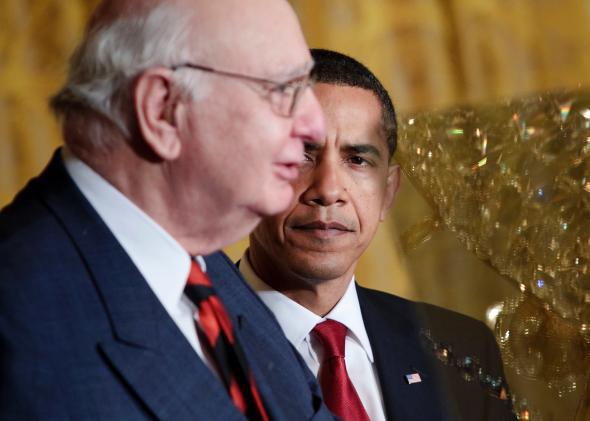The so-called “Volcker Rule” has always had a somewhat ambivalent place in the firmament of Obama administration financial regulation, but based on a preview provided by a senior Treausury official yesterday I think it’s fair to say that when it’s finalized in the next week or two the financial industry isn’t going to be happy with it.
The rule got its name from Paul Volcker, who advocated for it in the counsels of government. And the idea is essentially to do something in the spirit of Glass-Steagall by preventing financial institutions that have insured deposits from also doing speculative trading. That is an easy sentence to write down, but it’s harder to pin it down in legal language because the intention of the rule is to allow for “market making” trades and “hedging” trades. The issue is that there isn’t an entirely cut-and-dried difference between a hedge and a gamble. A rule that bans all gambles will end up banning some hedges, and a rule that allows all hedges will end up allowing some gambles.
As a matter of politics, this got messy because the President was enthusiastic about the idea but the top financial policy people in his administration—Lawrence Summers and Tim Geithner—were not. Geithner eventually got on the bus, Summers left the administration, and congress wrote it into law. But the actual work of operationalizing the rule kept dragging on and on and it looked like a relatively soft version of the rule was likely to be adopted. But momentum shifted over the past several months as the relevant regulatory agencies tried to zero-in on consensus, with some changes in the composition of the Securities and Exchange Commission perhaps playing the most important role.
Unlike his predecessor, Treasury Secretary Jack Lew doesn’t have a deep background as a financial regulator but in his role as a convenor and head-knocker he’s pushed the idea that it’s better to start out by erring on the side of a strict rule. That’s the right idea, and according to the senior official it’s the principle that will be entrenched. In particular, banks had been hoping for a rather broad loophole around the idea of “portfolio hedging” that they now look unlikely to get.
Industry pushback is that a strict Volcker Rule will result in an unnecessary level of market instability driven by a lack of liquidity. You should be skeptical of this argument, as the rule doesn’t attempt to ban market speculation—just ban a particular class of firms from engaging in it. If the Volcker Rule leads to some large set of profitable trades to go unmade, then other firms will step into the breach and go make them. That will be a loss for the particular regulated entities, but not for the economy at large.
